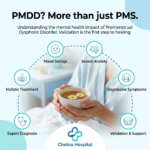When it comes to fertility and hormonal health, the thyroid gland often takes center stage. Shaped like a butterfly and located in your neck, this small but mighty gland produces hormones that regulate your metabolism, energy, and even your reproductive system. Surprisingly, many women are unaware of how significant thyroid health is to their ability to conceive and maintain a healthy pregnancy. Let’s dive deeper into how your thyroid impacts fertility and how you can optimize its health.
The Role of Thyroid Hormones in Reproductive Health
Thyroid hormones—namely T3 (triiodothyronine) and T4 (thyroxine)—are responsible for maintaining hormonal balance in the body. These hormones communicate with your brain and ovaries to regulate the menstrual cycle. If thyroid hormones are imbalanced, your body may experience disruptions that can make conception difficult.
1️⃣ Ovulation: For ovulation to occur, your thyroid hormones must be in sync with other reproductive hormones. Thyroid imbalances can result in anovulation (failure to release eggs), reducing your chances of pregnancy.
2️⃣ Menstrual Cycles: Irregular or heavy periods could signal an underlying thyroid issue. Both hyperthyroidism and hypothyroidism can lead to disrupted cycles.
3️⃣ Pregnancy Maintenance: A healthy thyroid is essential not only for conception but also for sustaining a pregnancy. Miscarriage, preterm birth, or complications may arise if thyroid disorders are untreated.
Thyroid Disorders and Fertility Issues
There are two common thyroid conditions that impact women’s health:
1. Hypothyroidism (Underactive Thyroid)
- Characterized by low production of thyroid hormones.
- Symptoms include fatigue, weight gain, depression, dry skin, and irregular periods.
- Women with hypothyroidism may face challenges with ovulation, making it harder to conceive.
- Unmanaged hypothyroidism during pregnancy can lead to developmental delays in the baby.
2. Hyperthyroidism (Overactive Thyroid)
- Characterized by excessive thyroid hormone production.
- Symptoms include weight loss, anxiety, excessive sweating, and frequent menstrual cycles.
- Hyperthyroidism increases the risk of miscarriage and other pregnancy complications.
📋 Did You Know? Subclinical thyroid disorders (mildly abnormal thyroid function) can still impact fertility. Regular screening is key to catching and managing these issues.
The Fertility-Thyroid Connection: What Science Says
Several studies have highlighted the connection between thyroid health and fertility. Researchers have found that even slight deviations in thyroid function can disrupt the balance of reproductive hormones like prolactin and luteinizing hormone (LH). Elevated levels of TSH (thyroid-stimulating hormone) can reduce the chances of successful implantation and increase the risk of miscarriage.
Women struggling with infertility are often advised to undergo thyroid function tests, as untreated thyroid disorders can undermine the success of fertility treatments like IVF.
Signs You Should Check Your Thyroid
- Irregular or missed periods
- Difficulty conceiving despite trying for 6-12 months
- Unexplained fatigue or weight changes
- Symptoms of hormonal imbalance, such as hair thinning or mood swings
How to Optimize Thyroid Health for Fertility
Here’s what you can do to support thyroid health and enhance your chances of conceiving:
- Get Tested: A simple blood test to measure TSH, T3, and T4 levels can determine thyroid function. If you have a family history of thyroid disorders or are facing fertility challenges, talk to your doctor about regular screenings.
- Focus on Nutrition: Your diet plays a significant role in thyroid health. Include iodine-rich foods (e.g., fish, dairy, eggs) to support thyroid hormone production. Selenium (found in nuts) and zinc (found in seeds) are also beneficial.
- Avoid Goitrogens: Raw cruciferous vegetables like cabbage and broccoli may interfere with thyroid function in excess. Cook them to neutralize their effect.
- Stay Active: Moderate exercise boosts metabolic and hormonal health, keeping your thyroid in optimal shape.
- Manage Stress: High stress levels can trigger or worsen thyroid issues. Consider relaxation techniques like yoga or meditation.
- Follow Treatment Plans: If diagnosed, take prescribed medications like levothyroxine for hypothyroidism or anti-thyroid medications for hyperthyroidism. Follow up with your doctor to adjust dosages as needed.
- Monitor During Pregnancy: Pregnant women with thyroid disorders require extra care, as their hormone levels must support both themselves and the growing baby.
When to See a Specialist
If you’re experiencing symptoms of thyroid dysfunction or facing challenges with conceiving, consult a gynecologist or an endocrinologist. These specialists can work together to create a treatment plan tailored to your needs.
Empower Yourself with Knowledge
Thyroid health is a cornerstone of overall well-being. By staying informed and proactive, you can take control of your reproductive health and set the stage for a smooth journey toward motherhood. Whether you’re planning for a baby or want to ensure optimal health, regular check-ups are essential. Remember, your health today determines your fertility tomorrow!
💡 Your Action Plan: Prioritize your health. Book a thyroid function test today and consult a specialist to learn more about optimizing your chances of a healthy pregnancy. 🌟
For Consultation Contact us on 9168690447
Website –
www.chetnahospital.co.in
Address – Chetna Hospital, Sambhajinagar, MIDC, G Block, Near Rotary Club, Chinchwad 411019
.
.
.
#hospital#pune#pcmc#chinchwad#health#healthcare#gynaecologist#femalegynaecologist#gynaecologistappointment#gynac#gynaecologistdoctor#gynaecologisthospital#goodgynaecologist#gynaecologistspecialist.













